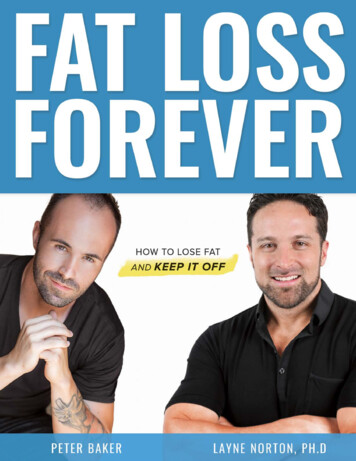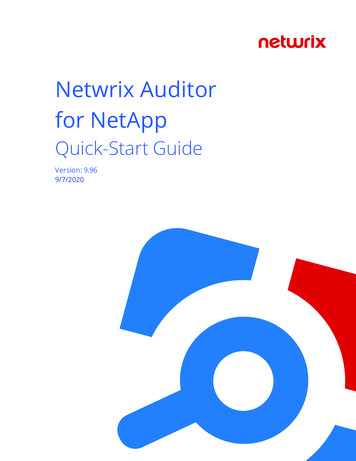
Transcription
CONTENTSForeword.31: Diets Are Failing.52: Energy Balance and Why It Matters.313: The Body’s Self Defense System.494: What Really Works?.715: Flexible Dieting.1016: Where to Start: How Many Calories?.1127: The Macronutrients: What You Need to Know.1418: Determining Your Macronutrient Intake.1709: Defending Against the Self Defense System.19810: You’ve Started. Now What?.21511: The Diet AFTER the Diet.23512: The Ketogenic Diet.262By Kristi Storoschuk and Dr. Dominic D’Agostino, University of South Florida13: Special Considerations.28214: Debunking the BS.29915: Supplements.34516: Conclusion.372
3FOREWORDWe’re at a great turning point of our time. Almost 40% of adults are obese and inexcess of 70% are considered overweight. In 2008, the estimated cost of obesity was 150 billion as a whole and over 1400 per year for the obese individual.This is a staggering drain on our healthcare system and on the individual, notjust physically, but financially, as well. Obesity significantly increases the riskfor developing type II Diabetes, heart disease, cancer, and several other majorchronic diseases that contribute to premature death. Not only does obesity increase the risk of disease and financial burden, but the psychological costs aresignificant. Obese people have a greater risk of developing depression and havelower self-esteem than non-obese adults.As such, billions of dollars in research money each year is devoted towards nutritional, exercise, and pharmaceutical interventions to help us lose weight. Everyyear, the obesity rate continues to climb. Many diets, drugs, and exercise programs have claimed to be the “cure” to the obesity crisis, and yet still, it rises.Many obese and overweight people feel helpless and hopeless because they’vetried every diet under the sun and the scale continues to climb. Unfortunately, webelieve that much of the education toward obesity and weight loss has focused onthe wrong things. Our society still largely believes that we have a problem withweight loss, but that is simply not true. Most people who attempt to lose weight(at least 10% of their body weight) are successful. If people are so successful atweight loss, why do we still have a growing obesity problem? While people aregood at losing weight, they are not good at keeping the weight off.It’s not because of the weight loss. It’s because they gain it all back. Weight regainstatistics are shocking. The statistics are different depending on the source, butwithin one year of weight loss, around 50-70% of people will have regained all
FOREWORD4the weight they lost. Further, 85% of people will gain it all back within two yearsof losing it. Within three years of weight loss, 95% of people will have gained itall back. Thus, the success rate of diets is 5%, and most are equally terrible.If this wasn’t bad enough, out of the people who regain weight, one-third totwo-thirds will add back more weight than they originally lost. Not only do theyfail to maintain their weight loss, but they end up worse than before they everstarted dieting. When these behaviors are cycled, we often refer to it as “yo-yodieting” or “weight cycling,” as scientists call it. There are a variety of physiological, psychological, and sociological reasons as to why this happens, and thisbook will cover these in great detail. In our opinion, yo-yo dieting may be thesingle biggest detriment to fighting obesity in existence. Sadly, many people getstuck in this cycle of losing weight, only to regain it, and more. It’s important tolook at our continual failures, note the similarities, and correct them so we don’tcontinue to make the same mistakes. It’s also important for us to understandwhat the successful 5% of dieters do so that we can also learn from what is being done correctly.In this book, we’ll attempt to break down why diets fail, how you can lose weightsuccessfully, and most importantly, how you can keep it off. This book is for thetired, frustrated, sad, and those who have little to no hope. There is a way, but itwill require knowledge, hard work, discipline, and dedication. On top of that, itwill involve letting go of fad diets, quick fixes, and “hacks.” If you haven’t figured it out by now, there is no “quick fix” that produces long-term sustainedresults. Period. If you do what you have always done, you will get what you havealways gotten. It’s time to make a change. If you’re ready to walk with us, thenwe’re ready to guide you, so let’s begin the journey.L AY N E N O R TO N , P H . D & P E TE R B AK ER
51DIETS ARE FAILING“*If you can’t see yourself sticking to your diet one year from now, you needto re-think your strategy. If you don’t like the way you eat, you won’tstick to it for long, and it’ll only be a matter of time before you jump shipand end up regaining all the weight.S O HE E LE E , M S , CS CS , CIS SNWhy Should I Care About Losing Fat?This is the question. However, it’s relatively easy to answer. For one thing,thinking about food is a part of our gestalt. As you read this, I want youto think back a few years. Then, think even further back. Think about allthe diets you have ever heard of growing up. If you are keen on the details, youmight notice that some of these diets and practices are cyclical—for example, thevarious iterations of a low carb diet. On a broader scale, it’s the fact that nameddiets exist at all. While dieting is part of our culture, there are many benefits toweight loss, especially if you are overweight or obese. Benefits include but are notlimited to, increased longevity, decreased risk for Cardiovascular disease (CVD),*Before you dive in, remember you can pull up the studies cited by clicking the URL listed in each footnote
DIETS ARE FAILING6decreased risk for cancer, decreased risk of type II diabetes, improved quality oflife, and let’s not forget the obvious one—looking sexy.1 2 3 4 We should point outthat these benefits can be achieved regardless of the type of diet you implement.Simply losing body fat and weight overall has a huge impact on all of these outcomes, REGARDLESS of the type of diet you use. Indeed, high carbohydrate, lowfat diets that produce weight loss can also include health benefits.5 In contrast,low carbohydrate, high fat diets have also shown similar health benefits whenweight loss is achieved.67More moderate diets? Same deal. Vegan?8 You bet itdoes, if it produces weight loss.9 10We can’t name one person we’ve known who hasn’t been on or claimed to be onat least one diet in their lifetime. There are as many diets that claim to be the answer to all our problems as there are stars in the sky. Speaking of the sky, did we1 (2015, November 4). Effects on cardiovascular risk factors of weight losses . - NCBI - NIH. RetrievedAugust 30, 2018, from 06/2 (2014, February 18). The importance of weight management in type 2 diabetes . - NCBI - NIH.Retrieved August 30, 2018, from 18/3 (2017, September 6). Intentional weight loss and cancer risk - NCBI - NIH. Retrieved August 30, 2018,from 36/4 (2017, November 15). Effects of weight loss interventions for adults who are . - NCBI - NIH. RetrievedAugust 30, 2018, from 93/5 "Comparison of the Atkins, Ornish, Weight Watchers, and . - NCBI - NIH." 5 Jan. 2005, https://www.ncbi.nlm.nih.gov/pubmed/15632335. Accessed 4 Sep. 2018.6 "Effects of Low-Carbohydrate Diets Versus Low-Fat Diets on Metabolic ." 64/. Accessed 4 Sep. 2018.7 "The effects of low-fat, high-carbohydrate diets on plasma lipoproteins ." https://www.ncbi.nlm.nih.gov/pubmed/16255999. Accessed 4 Sep. 2018.8 (n.d.). The BROAD study: A randomised controlled trial using a . - NCBI - NIH. Retrieved September 4,2018, from 96/9 "Comparison of the Atkins, Ornish, Weight Watchers, and . - NCBI - NIH." 5 Jan. 2005, https://www.ncbi.nlm.nih.gov/pubmed/15632335. Accessed 4 Sep. 2018.10 "Long-Term Effects of 4 Popular Diets on Weight Loss and ." tcomes.113.000723. Accessed 4 Sep. 2018.
DIETS ARE FAILING7mention there is a “Lunar Diet?” Seriously, we aren’t making this up. Want us toget weird? How about the “Avoiding Swamps Diet?” In the 1700s Thomas Shortobserved that more fat people lived near swamps and hypothesized that avoidingthem may be the key to staying svelte. “The Tapeworm Diet” is still a thing, too.Apparently people think it’s a good idea to ingest parasites so that they can eatwhat they want and lose weight. Enjoy your alcohol? Get on “The Drinking Man’sDiet” where there are no restrictions on gin and vodka. Don’t laugh. Robert Cameron sold over 2 million copies of this diet in the 1960s. That might have been adiet of sin, but what about a diet void of sin? Sylvester Graham was a minister whobelieved that people were fat because they had too much sex. In the 1800s, he promoted The Graham Diet (vegetarian) and if his last name seems familiar, it’s because he was the father of the Graham Cracker. You heard it here, Graham Crackers were developed in an effort to reduce obesity and stop people from having sex.Today, some of the more popular diets are the Blood Type diet, Alkaline Diet,Paleo Diet, Carnivore diet, Ornish diet, Atkins Diet, Snake Diet (we aren’t making this one up either), The Zone Diet, South Beach Diet, The Ketogenic Diet,The Mediterranean Diet, and the list goes on and on. Some of these diets havelegitimate benefits and some are straight up fads (we’ll cover these in a specificchapter later in the book). In fact, let’s take a look at low carb dieting. At the timeof this writing, it’s en vogue. You can barely go out in the world or on the internetwithout talking to someone who is “on keto” or going low carb. Some might remember a popular diet in the late 20th century/early 21st century called the Atkins Diet. Maybe your parents were on the Atkins Diet, or maybe you went to yourbest friend’s house to play Dungeons & Dragons, and you noticed a lot of bacon inthe fridge (and all you wanted was cheap ramen). Then, you asked your friend,“Why do you have so much bacon?” Lo and behold, your friend said their parentswere both on the Atkins Diet, and you thereby assumed that you could eat all thebacon you wanted on this diet. Cool, right?
DIETS ARE FAILING8Now, if any of you reading this are lucky enough to have been alive in the middleof the 19th century, right around the 1860s, you might remember the first lowcarb diet. It all started with an undertaker. This undertaker thought corpulencewas a problem. So, William Banting, the 19th century English undertaker, wrotea letter called Letter on Corpulence, Addressed to the Public. Now, we must give acertain amount of credit to Banting. He said:It would afford me infinite pleasure and satisfaction to name the authorof my redemption from the calamity, as he is the only one that I have beenable to find (and my search has not been sparing) who seems thoroughlyup in the question; but such publicity might be construed improperly, andI have, therefore, only to offer my personal experience as the steppingstone to public investigation, and to proceed with my narrative of facts,earnestly hoping the reader will patiently peruse and thoughtfully considerit, with forbearance for any fault of style or diction, and for any seemingpresumption in publishing it.11Despite how happy he was on the low carb diet, he didn’t claim it to be a panacea.He, in true scientific fashion, observed something, and questioned whether theresults were repeatable by saying he hopes his experience can be a stepping-stoneto more research. We should expect no less from a man who handled embalmingfluids and dead bodies.In August of 1862, the 5’5 202 lb Banting embarked on his low carbohydrate dietand dropped 35 lbs to a svelte 167 lbs. Banting even goes on to list his restrictedfoods. It’s worth noting that both milk and butter are on his banned food list, butthose foods aren’t high carbohydrate foods. Butter and milk have quite a bit of fatin them. In the literary world, this is foreshadowing. We’ll talk about why the fatcontent of these foods matter, and then you’ll see why Banting was successful on11 (n.d.). Letter on Corpulence, Addressed to the Public - Wiley Online Library. Retrieved August 21, 2018,from 1550-8528.1993.tb00605.x
DIETS ARE FAILING9this diet. But there was more than just butter and milk to rid himself of. Bread,sugar, beer, and potatoes were on the list, too.So, now that Banting’s diet had all the greatness stripped from it, what was left?Well, he was still allowed to drink gin for a nightcap, or a glass or two of sherry.Not only that, his meal plan looked
LAYNE NORTON, PH.D & PETER BAKER FOREWORD. 5 Why Should I Care About Losing Fat? T his is the question. However, it’s relatively easy to answer. For one thing, thinking about food is a part of our gestalt. As you read this, I want you to think back a few years. Then, think even further back. Think about all the diets you have ever heard of growing up. If you are keen on the details, you .











